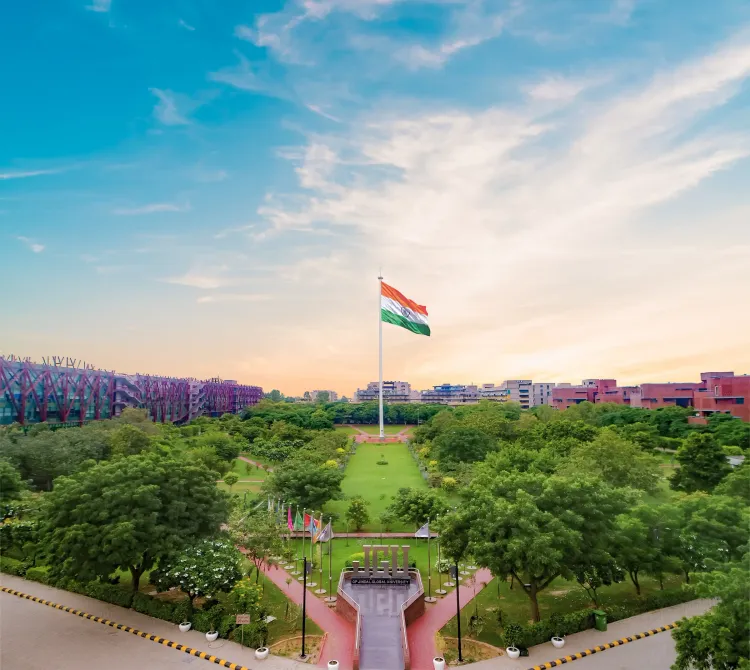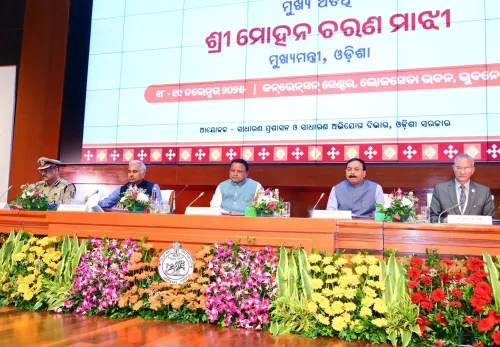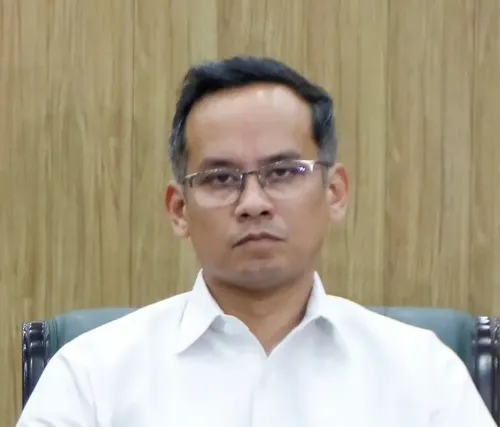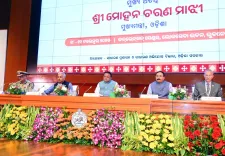Kos Minar International Documentary Film Festival: A Three-Day Celebration of Engaging Cinema at OP Jindal Global University

Synopsis
Key Takeaways
- Innovative documentaries showcased from India and worldwide.
- Engaging discussions between filmmakers, students, and audiences.
- Honoring the legacy of Kumar Shahani.
- Highlighting marginalized communities in contemporary narratives.
- Fostering an interdisciplinary approach to documentary filmmaking.
Sonipat, March 27 (NationPress) In celebration of the fifteenth anniversary of O.P. Jindal Global University (JGU), the Jindal School of Journalism and Communication (JSJC) organized a groundbreaking international documentary film festival from March 21 to March 23 on its campus.
The festival was inaugurated by Vice Chancellor Prof (Dr) C. Rajkumar, who emphasized, “We are in an age where we can confidently state that impactful films can emerge solely from the strength of an idea.”
Registrar Prof Dabiru Sridhar Patnaik remarked in his welcome speech, “This festival is not merely a tribute to cinema; it is an homage to storytelling, human resilience, and truth.”
JSJC Dean Prof Kishalay Bhattacharjee noted, “Recently, documentaries have brought global recognition to Indian cinema. Documentarians are not just journalists; they delve into the essence of the human experience.”
At the launch of its B.A. (Hons) Film and New Media Programme in 2022, JSJC proclaimed its aim to host one of the premier documentary film festivals worldwide. The three-day Kos Minar International Documentary Film Festival lived up to this commitment, uniting students, faculty, and external audiences to view and discuss a series of impactful, emotional, and thought-provoking documentaries from India and beyond. Documentaries have consistently pushed the boundaries of cinema, embodying an enduring human urge to highlight stories, facts, and truths.
This festival, named after the Kos Minar—a historical distance marker along the Grand Trunk Road, one of Asia’s longest and oldest thoroughfares connecting various ancient empires—showcased innovative approaches to documentary filmmaking by young and emerging directors.
Traditionally, Kos Minars served as landmarks for travelers and as stations for royal couriers delivering messages and transporting wealth; JGU is positioned near one such Kos Minar, symbolizing the university's role at the intersection of global communication.
In this spirit, the Kos Minar International Documentary Film Festival featured some of the most outstanding contemporary documentaries from around the globe and fostered enriching dialogues between filmmakers, cinema enthusiasts, and students.
On March 21, the festival commenced by honoring the legendary filmmaker Kumar Shahani, who passed away on February 24, 2024. One of Shahani’s final public appearances was during the launch of JSJC’s B.A. (Hons) Film and New Media Programme. To commemorate Shahani, the keynote address titled Remembering Kumar was given by renowned film scholar Ashish Rajadhyaksha.
Rajadhyaksha highlighted the vast array of Shahani’s interests, which spanned the global history of cotton, D.D. Kosambi’s interpretation of the Mahabharata, Buddhist iconography, Indian classical music, and the Bhakti tradition.
The discussion showcased Shahani’s innovative techniques in form, performance, and musical traditions in his films, thereby introducing his work to a new audience.
The opening film on Day 1 was Payal Kapadia’s A Night of Knowing Nothing—a captivating portrayal of Indian youth, their fears, aspirations, and pursuit of justice, which won the Best Documentary Film award at the 2021 Cannes Film Festival. This was followed by Prachee Bajania’s Umbro—an intimate short film depicting a circle of Gujarati women, particularly mothers, carving out time from their daily lives for friendship and leisure.
Subsequently, Anupama Srinivasan and Anirban Dutta presented Flickering Lights, a narrative of patience and hope as a remote village near the Indo-Burmese border awaited electricity for seven years.
Day 2 began with two recent Sundance film festival award winners: Sarvnik Kaur’s Against the Tide and Snow Hnin Ei Hlaing’s Midwives. Both films shed light on marginalized communities (fishermen from Mumbai and midwives from Myanmar, respectively) grappling with broader global forces reshaping their traditional livelihoods.
Through narratives of personal friendships and conflicts amid troubled waters and war-torn landscapes, these films captured the spirit of human resilience and solidarity. These presentations were facilitated by Docedge Kolkata—Asian Forum for Documentary, a leading platform for supporting and financing independent documentary filmmaking in Asia.
Later, Sreemoyee Singh’s And, Towards Happy Alleys offered a personal, musical exploration of the streets of Iran.
During the Q&A session, Sreemoyee Singh recounted her experiences as a young researcher and filmmaker—how her passion for Iranian cinema, poetry, and music inspired her to learn Persian and embark on a journey to Iran, meeting the country’s finest filmmakers and documenting the stories of Iranian women striving for dignity, often expressing through music.
Day 3 commenced with Haobam Paban Kumar’s Phum Shang and Raja Shabir Khan’s Shepherds of Paradise—two compelling films focusing on marginalized communities from Kashmir and Manipur, exploring their profound connection to land and water, even as natural forces and changing laws threaten their existence.
In addition to the Q&A session with both filmmakers, students had a unique opportunity to engage with them in a dedicated technical session.
The festival also featured three short experimental films by Berlin-based Palestinian filmmaker, Basma Al Sharif, and a selection of films addressing climate change and ethics, presented by Alt Eff (All Living Things Environmental Film Festival).
Event partner and global streaming platform MUBI organized special film quizzes for students, with exclusive merchandise as prizes.
The Kos Minar International Documentary Film Festival ultimately showcased the power of independent filmmaking in bringing both familiar and lesser-known narratives to new audiences, while also embodying the interdisciplinary spirit of the Jindal School of Journalism and Communication.
The festival's three days opened a window to the world—traversing nations, landscapes, and ecologies, where attendees engaged with diverse people, places, customs, and environments; shared in their struggles for dignity and justice; celebrated their moments of joy; and most importantly, witnessed their courage in standing for the truth.








